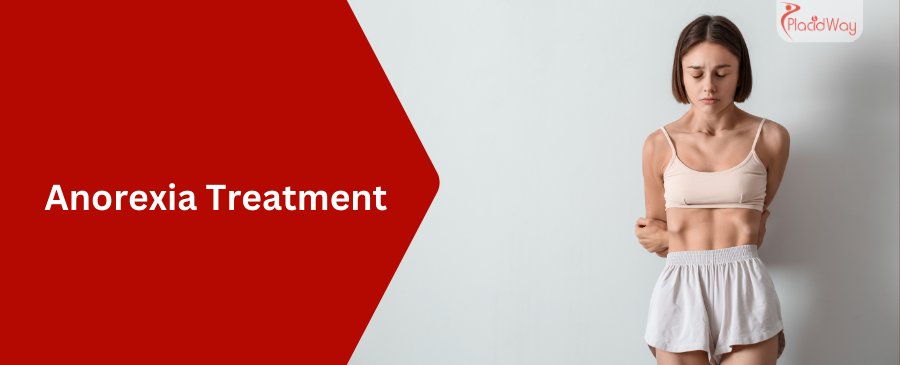
Finding Hope: Comprehensive Anorexia Treatment Options for Lasting Recovery
Anorexia Nervosa is a serious eating disorder characterized by an intense fear of gaining weight, a distorted body image, and severe restriction of food intake. It impacts millions worldwide, transcending cultural and geographical boundaries. For individuals and families grappling with this challenging condition, finding effective, compassionate, and accessible anorexia treatment is paramount. The journey to recovery is deeply personal, often requiring specialized care that addresses both the physical and psychological complexities of the disorder.
Many patients are now looking beyond their borders for eating disorder treatment abroad, seeking centers that offer cutting-edge therapies, a supportive environment, and sometimes, a more affordable path to healing. Medical tourism for anorexia treatment provides an opportunity to access world-class facilities, highly trained specialists, and a fresh start in a new setting, away from the triggers and pressures of home. This guide will explore the intricacies of anorexia, its symptoms, causes, and the comprehensive treatment options available, including why international care might be the right choice for you or a loved one seeking lasting recovery.
What are the critical warning signs and symptoms of Anorexia Nervosa?
Recognizing the warning signs of anorexia is crucial for early intervention and better outcomes. Patients and their families often ask, "What are the early indicators of an eating disorder?" or "How can I tell if someone has anorexia?" The signs can be physical, emotional, and behavioral. Physically, look for extreme weight loss, a refusal to maintain a healthy body weight, fatigue, dizziness, thinning hair, dry skin, and absence of menstruation in females (amenorrhea). Behaviorally, individuals may restrict certain food groups, skip meals, obsessively count calories, develop ritualistic eating habits, exercise excessively, withdraw socially, or deny feeling hungry. Emotionally, signs include intense fear of gaining weight, body dissatisfaction, irritability, depression, anxiety, and a tendency to isolate themselves. It's not just about being thin; it's a pervasive mental preoccupation with food, weight, and body shape that significantly impairs daily life.
What factors contribute to the causes and risk of developing Anorexia Nervosa?
Many people wonder, "What causes someone to develop anorexia?" or "Is anorexia genetic?" The truth is, there isn't a single cause, but rather a complex interplay of genetic, psychological, and environmental factors. Genetic predisposition plays a role; if a close family member has an eating disorder, your risk may be higher. Psychological factors such as perfectionism, anxiety, obsessive-compulsive traits, and low self-esteem are often seen in individuals with anorexia. Environmental and sociocultural pressures, including media portrayals of thinness, cultural emphasis on appearance, and bullying related to weight, can also contribute. Significant life transitions, traumatic events, or certain sports/professions (e.g., ballet, modeling) can act as triggers. Understanding these multifaceted causes helps in developing a holistic eating disorder treatment plan that addresses all aspects of the patient's life.
What are the various effective treatment approaches for Anorexia Nervosa?
When searching for "how to recover from anorexia" or "best therapies for eating disorders," you'll find that a multi-faceted approach is key. Treatment typically involves a team of professionals, including doctors, dietitians, and therapists. Core components include:
- Medical Stabilization: Addressing severe malnutrition, electrolyte imbalances, and other physical complications that can be life-threatening.
- Nutritional Rehabilitation: Working with a dietitian to restore a healthy weight, establish normal eating patterns, and educate on healthy nutrition.
- Psychotherapy:
- Cognitive Behavioral Therapy (CBT): Helps identify and change distorted thoughts and behaviors related to food, weight, and body image.
- Family-Based Treatment (FBT) / Maudsley Approach: Especially effective for adolescents, empowering parents to help their child with re-feeding and recovery.
- Dialectical Behavior Therapy (DBT): Focuses on emotional regulation, distress tolerance, and interpersonal effectiveness.
- Individual and Group Therapy: Provides a safe space to explore underlying issues, develop coping mechanisms, and build support.
- Medication: While no specific medication cures anorexia, some antidepressants (SSRIs) may be used to treat co-occurring depression or anxiety once weight restoration has begun.
Treatment settings can range from outpatient care to residential programs or even inpatient hospitalization, depending on the severity of the condition.
Who is typically eligible for specialized anorexia treatment programs?
Many people ask, "When should I seek help for anorexia?" or "Am I sick enough for anorexia treatment?" Eligibility for specialized anorexia treatment centers is usually determined by the severity of the illness, medical stability, and the level of care required. Generally, anyone diagnosed with anorexia nervosa can benefit from treatment. Specific criteria for higher levels of care (like residential or inpatient programs) often include:
- Significant medical instability (e.g., dangerously low heart rate, blood pressure, or electrolyte imbalances).
- Rapid or severe weight loss, or refusal to gain weight in an outpatient setting.
- Severe psychiatric co-morbidities (e.g., severe depression, suicidal ideation, psychosis) that complicate outpatient treatment.
- Failure to progress or deterioration in lower levels of care.
- Lack of adequate social support or a safe home environment.
It’s important to remember that early intervention offers the best chance for full recovery, so seeking help as soon as symptoms appear is always advisable, regardless of perceived "severity."
What is the expected recovery timeline and journey for individuals with anorexia?
The question "How long does it take to recover from anorexia?" is common, but the answer is complex. Anorexia recovery is not a quick fix; it's a marathon, not a sprint. The journey is highly individualized and can range from several months to several years. It often involves different phases:
- Acute Treatment Phase: This initial phase focuses on medical stabilization, weight restoration, and interrupting eating disorder behaviors. It might occur in an inpatient or residential setting and can last from weeks to months.
- Rehabilitation and Therapeutic Phase: Once medically stable, the focus shifts to intensive psychotherapy, addressing underlying psychological issues, developing coping skills, and challenging distorted thoughts. This phase often involves intensive outpatient programs (IOP) or partial hospitalization programs (PHP), lasting several months.
- Maintenance and Relapse Prevention: This ongoing phase involves continued outpatient therapy, dietitian support, and building a strong support system. It emphasizes relapse prevention strategies and integrating new, healthy behaviors into daily life, which can continue for years.
Recovery is not linear; there may be setbacks, but these do not signify failure. With persistent effort and support, full recovery from anorexia is absolutely possible, leading to a life free from the grip of the eating disorder.
Are there potential risks or side effects associated with anorexia treatment?
Beginning eating disorder treatment for anorexia is a courageous step, but it's natural to wonder about potential challenges. "Are there dangers in anorexia recovery?" is a valid concern. One of the most significant risks, particularly in severe cases, is Refeeding Syndrome. This occurs when severely malnourished individuals begin to eat normally, causing dangerous shifts in fluid and electrolyte levels. Medical teams closely monitor patients during initial re-feeding to prevent this. Beyond medical risks, treatment can bring emotional challenges:
- Increased Anxiety and Depression: As patients gain weight and confront their fears, anxiety and depressive symptoms can intensify temporarily.
- Body Image Distress: The process of weight restoration often leads to significant distress regarding body image, requiring intensive psychological support.
- Resistance to Treatment: Due to the ego-syntonic nature of anorexia (the illness feeling like a part of oneself), patients may resist aspects of treatment.
- Gastrointestinal Discomfort: As the digestive system re-adjusts, patients may experience bloating, constipation, or discomfort.
These "side effects" are often a necessary part of the healing process and are managed by the treatment team to ensure patient safety and comfort. The benefits of treatment far outweigh these temporary difficulties.
How does the cost of anorexia treatment vary across different countries?
For many seeking "affordable anorexia treatment" or "cost of eating disorder treatment internationally," the financial aspect is a significant concern. The cost of anorexia treatment can vary dramatically based on the country, the type of program (inpatient, residential, outpatient), the duration of stay, and the intensity of therapies offered. Here's a general comparison:
| Country | Typical Monthly Cost (USD) | Notes |
|---|---|---|
| United States | $30,000 - $60,000+ | Among the highest, extensive insurance coverage often required. |
| United Kingdom | $20,000 - $45,000+ | High quality, but significant cost for private residential programs. |
| Thailand | $10,000 - $25,000 | Growing number of luxury and specialized programs at lower cost. |
| Mexico | $8,000 - $20,000 | Often provides high-quality care at a more accessible price point. |
| South Africa | $7,000 - $18,000 | Reputable centers with competitive pricing. |
These figures are estimates and can vary based on the specific clinic, duration, and services included. Medical tourism can significantly reduce the financial burden, making life-saving treatment more attainable.
Why might seeking Anorexia Nervosa treatment abroad be a beneficial option?
"Why go abroad for anorexia treatment?" This is a question many consider when local options seem insufficient, too expensive, or lack specialized care. The benefits of medical tourism for anorexia are numerous:
- Cost-Effectiveness: As seen in the table above, the same or even higher quality of care can be found at a fraction of the cost in many international destinations.
- Access to Specialized Programs: Some countries boast highly specialized clinics offering unique or innovative treatment modalities not readily available elsewhere.
- Privacy and Anonymity: For many, the stigma associated with eating disorders makes local treatment difficult. Traveling abroad provides a level of privacy and discretion.
- New Environment, New Perspective: A change of scenery can be incredibly therapeutic, removing individuals from familiar triggers, stressors, and routines, allowing for a complete focus on healing.
- Reduced Wait Times: In some regions, waitlists for specialized eating disorder care can be lengthy. International clinics often have shorter or no wait times.
- Comprehensive Wellness: Many international programs integrate holistic therapies like yoga, meditation, art therapy, and nature-based activities into their treatment plans, enhancing overall well-being.
What should patients expect when traveling internationally for anorexia recovery?
"What is it like to get anorexia treatment overseas?" The experience will vary, but generally, you can expect a structured journey. PlacidWay helps coordinate many aspects, making the process smoother:
- Pre-Travel Planning: This involves consultations with the chosen clinic, medical record review, visa applications, and travel arrangements.
- Arrival and Orientation: Upon arrival, you’ll typically be greeted and transported to the facility. An orientation period helps you adjust to the new environment and program structure.
- Intensive Treatment Schedule: Days are usually structured with individual therapy, group sessions, meal support, nutritional education, medical check-ups, and possibly complementary therapies.
- Cultural Immersion (Optional): Depending on the location, there might be opportunities for cultural activities, which can be part of the therapeutic process.
- Continuous Support: The focus is on providing a safe, therapeutic environment where you can fully immerse yourself in recovery without external distractions.
- Aftercare Planning: A crucial part of international treatment is developing a robust aftercare plan for continued support once you return home.
It's important to be prepared for both the therapeutic challenges and the logistical aspects of international travel, ensuring a smooth and effective recovery journey.
How can one ensure the safety and quality of anorexia treatment centers overseas?
Ensuring the quality and safety of "best anorexia treatment centers abroad" is paramount. It’s natural to ask, "How do I choose a safe eating disorder clinic overseas?" Here are key steps:
- Accreditation and Licensing: Verify that the clinic is accredited by recognized international bodies (e.g., Joint Commission International - JCI) and licensed by local health authorities. This indicates adherence to high standards of care.
- Staff Qualifications: Inquire about the credentials and experience of the medical doctors, psychiatrists, psychologists, dietitians, and other therapists on staff. They should be highly specialized in eating disorder treatment.
- Treatment Approach: Ensure the clinic's treatment philosophy aligns with evidence-based practices (e.g., CBT, FBT, DBT) and offers a comprehensive, individualized plan.
- Patient Testimonials and Reviews: Seek out genuine patient success stories and independent reviews to gauge past patient experiences.
- Emergency Protocols: Understand the clinic's medical emergency procedures, including access to nearby hospitals and specialized medical care.
- Communication and Language: Confirm that staff can communicate effectively in your preferred language and that translation services are available if needed.
- Facilitator Support: Partnering with a trusted medical tourism company like PlacidWay can provide an extra layer of security, as they vet clinics and assist with the entire process.
What kind of support is available after initial anorexia treatment?
The journey of "anorexia recovery" doesn't end when a residential program concludes. In fact, aftercare is a critical component for preventing relapse and sustaining long-term health. "What happens after inpatient anorexia treatment?" is a vital question. Effective aftercare plans typically include:
- Outpatient Therapy: Continuing individual or group psychotherapy sessions to solidify coping skills, address new challenges, and maintain psychological well-being.
- Nutritional Counseling: Regular follow-ups with a dietitian to ensure healthy eating patterns are maintained and to address any lingering food anxieties.
- Support Groups: Joining local or online support groups (e.g., ANAD, NEDA) can provide peer support, reduce feelings of isolation, and share experiences.
- Relapse Prevention Planning: Developing a personalized plan that identifies triggers, outlines coping strategies, and includes a clear action plan for seeking help if a relapse occurs.
- Family Involvement: Ongoing family therapy or support can help rebuild relationships and create a supportive home environment.
- Medical Monitoring: Regular check-ups with a primary care physician to monitor physical health, especially in the initial post-treatment phase.
Many international clinics also offer virtual follow-up sessions, making the transition back home smoother. A robust aftercare plan is the bridge between intensive treatment and independent, recovered living.
Take the Next Step with PlacidWay
Ready to explore treatment options abroad? Discover top clinics, compare prices, and get a free quote tailored to your needs with PlacidWay.





.png)
.png)
.png)
.png)

Share this listing